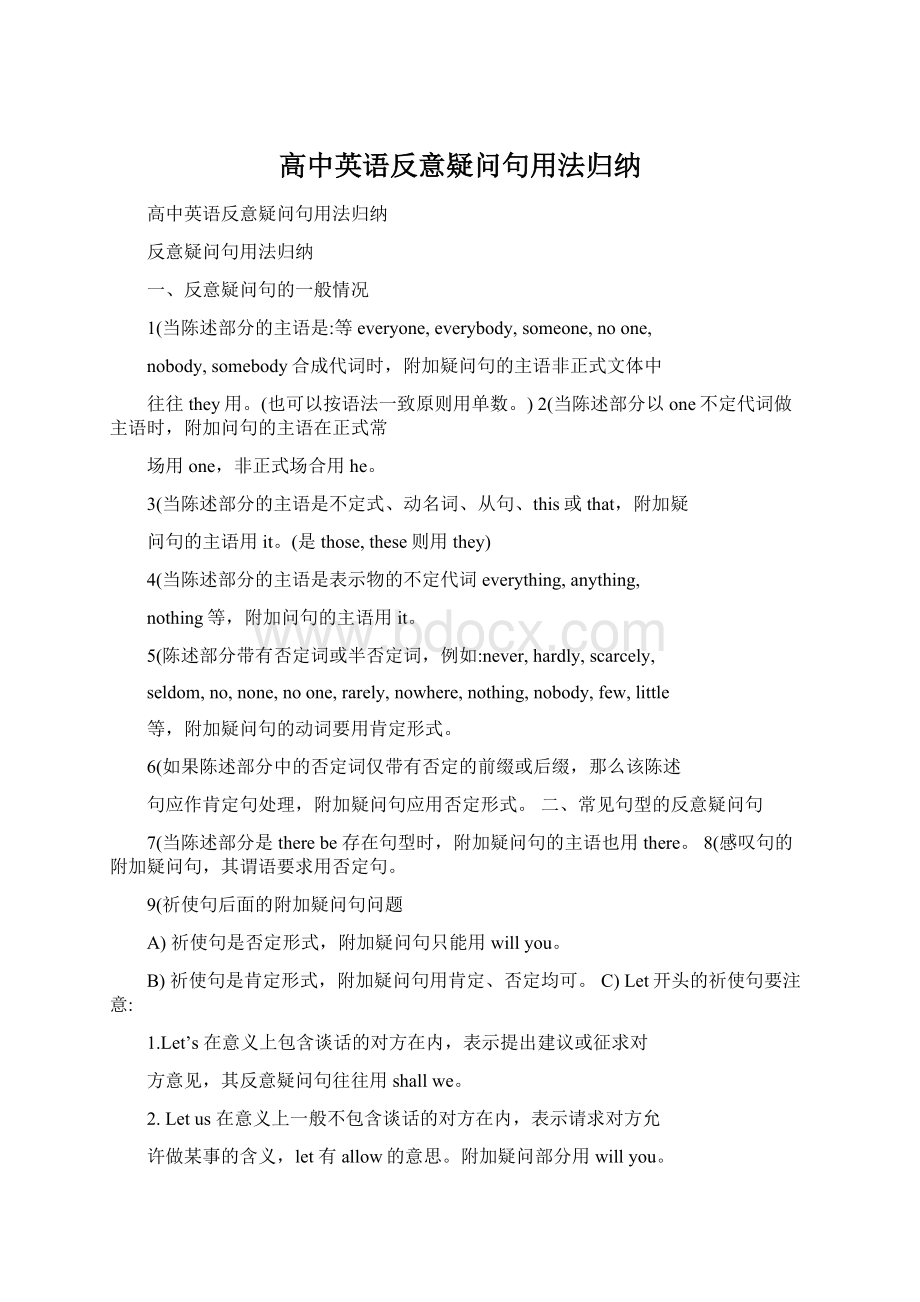高中英语反意疑问句用法归纳.docx
《高中英语反意疑问句用法归纳.docx》由会员分享,可在线阅读,更多相关《高中英语反意疑问句用法归纳.docx(8页珍藏版)》请在冰豆网上搜索。

高中英语反意疑问句用法归纳
高中英语反意疑问句用法归纳
反意疑问句用法归纳
一、反意疑问句的一般情况
1(当陈述部分的主语是:
等everyone,everybody,someone,noone,
nobody,somebody合成代词时,附加疑问句的主语非正式文体中
往往they用。
(也可以按语法一致原则用单数。
)2(当陈述部分以one不定代词做主语时,附加问句的主语在正式常
场用one,非正式场合用he。
3(当陈述部分的主语是不定式、动名词、从句、this或that,附加疑
问句的主语用it。
(是those,these则用they)
4(当陈述部分的主语是表示物的不定代词everything,anything,
nothing等,附加问句的主语用it。
5(陈述部分带有否定词或半否定词,例如:
never,hardly,scarcely,
seldom,no,none,noone,rarely,nowhere,nothing,nobody,few,little
等,附加疑问句的动词要用肯定形式。
6(如果陈述部分中的否定词仅带有否定的前缀或后缀,那么该陈述
句应作肯定句处理,附加疑问句应用否定形式。
二、常见句型的反意疑问句
7(当陈述部分是therebe存在句型时,附加疑问句的主语也用there。
8(感叹句的附加疑问句,其谓语要求用否定句。
9(祈使句后面的附加疑问句问题
A)祈使句是否定形式,附加疑问句只能用willyou。
B)祈使句是肯定形式,附加疑问句用肯定、否定均可。
C)Let开头的祈使句要注意:
1.Let’s在意义上包含谈话的对方在内,表示提出建议或征求对
方意见,其反意疑问句往往用shallwe。
2.Letus在意义上一般不包含谈话的对方在内,表示请求对方允
许做某事的含义,let有allow的意思。
附加疑问部分用willyou。
3.Letme开头表示请求,附加疑问句用willyou,或用mayI。
三、复合句的反意疑问句
10(当陈述部分是一个(带that引导宾语从句的)主从复合句时,附
加疑问句的主谓要和主句的主谓保持对应关系。
但是,当陈述部
分的主语是:
Isuppose,Ithink,Ibelieve,Iimagine,Iexpect等结构
时,附加疑问句的主语和谓语要和从句的主语,谓语保持一致关
系。
而且要注意到否定的转移问题。
11(当陈述部分是I’msurethat,;wearesure;I’mafraidthat;Weare
surethat;Ifeelsurethat等后面跟宾语从句时,反意疑问句与后面
的宾语从句一致。
12(当陈述部分是并列句时,附加疑问句的主谓语要和离它最近的句
子的主谓保持对应关系。
四、关于情态动词的反意疑问句
13(陈述部分中有have一词,且表示“所有”含义时,附加疑问句
部分既可用have也可用do。
14(陈述部分中有haveto,附加疑问句部分用do。
15(含有oughtto的反意疑问句,陈述部分是肯定的,疑问部分用
shouldn't/oughtn't+主语。
Heoughttoknowwhattodo,oughtn'the?
/shouldn'the?
16(陈述部分有usedto,附加疑问句部分可用used也可以用did。
17(陈述部分有needn’t时,附加疑问句部分用need但有时也可用
must。
18(陈述部分有must,且表示“必须”,附加疑问句部分用mustn‘t,
如果表示“必要”则用needn’t。
19(陈述部分中是mustn’t表示“禁止”时,附加疑问句部分用must。
陈述部分中的must表示“一定”、“想必”等推测意义时,附加疑
问句部分而是根据陈述部分的谓语动词或其助动词来定。
20(陈述部分是Iwish,表询问或征求意见,附加疑问部分用mayI。
21(弄清陈述句中的’drather=wouldrather;’dbetter=hadbetter
附加疑问句部分前者用would,后者用had。
其它特殊结构的反
意疑问句
22(陈述部分的主语是eachof...结构时,附加疑问句在强调整体时用
they,当作个别时用he。
23(陈述部分有neither...nor...(either...or...)做并列主语,附加疑问部分
根据其实际逻辑意义而定。
NeitheryounorIamengineer,arewe?
24(陈述部分是:
I’m....结构,附加疑问句一般用aren’tI?
25.陈述部分有hadbetter+v.疑问句部分用hadn'tyou?
You'dbetterreaditbyyourself,hadn'tyou?
26.陈述部分有wouldrather+v.,疑问部分多用wouldn't+主语。
Hewouldratherreadittentimesthanreciteit,wouldn'the?
27.陈述部分有You'dliketo+v.疑问部分用wouldn't+主语。
You'dliketogowithme,wouldn'tyou?
28.带情态动词dare或need的反意疑问句,疑问部分常用need(dare)
+主语。
Weneednotdoitagain,needwe?
Hedarenotsayso,dareyou?
当dare,need为实义动词时,疑问部分用助动词do+主语。
Shedoesn'tdaretogohomealone,doesshe?
附加疑问句
热点一、祈使句后的附加疑问句。
1(Weforgottobringourtickets,butpleaseletusenter,_______.
A.doyouB.canweC.willyouD.shallwe
2(—Alice,youfeedthebirdtoday,______?
—ButIfedityesterday.(NMET1999)
A.doyouB.willyouC.didn’tyouD.don’tyou
3.Besuretowritetous,_______?
(NMET1993)
A.willyouB.aren’tyouC.canyouD.mustn’tyou
4.Don’tsmokeinthemeeting-room,______?
(NMET1991)
A.doyouB.willyouC.canyouD.couldyou
5.Itisafineday.Let’sgofishing,______?
(NMET1990)
A.won’tweB.willweC.don’tweD.shallwe
【解析】1.C2.B3.A4.B5.D。
在由“祈使句+附加疑问”构成
的附加疑问句中,附加疑问部分一般用willyou,won’tyou,
wouldyou等。
但是,以let’s开头的祈使句,附加疑问部分
用shallwe;以letus开头的祈使句,含义不包括听话人在内,
疑问部分用willyou。
例如:
Let’shaveabasketballmatchthisafternoon,shallwe?
Letusgooutforarest,willyou?
热点二、Therebe句型后的附加疑问句。
Therewasaloudscreamfromthebackstageimmediatelyafterthe
concertended,______?
A.wasn’tthereB.wasthereC.didn’titD.didit
【解析】A。
当陈述句为therebe结构时,附加疑问句也用there。
There’snohelpforit,isthere?
There’ssomethingwrong,isn’tthere?
热点三、含有宾语从句的主从复合句中的附加问句。
A)一般主从复合句:
1(Heneversaidthathewasgoodatmathematics,_______?
A.washeB.wasn’theC.didheD.didn’the
2(Mrs.Blackdoesn’tbelievehersonisabletodesignadigital
camera,_______?
A.isheB.isn’theC.doesn’tsheD.doesshe
3(Braintoldyouthattherewasn’tanyoneintheroomatthat
time,_______?
A.wasthereB.wasn’ttherC.didn’theD.didhe
【解析】1.C2.D3.C。
当陈述部分为主从复合句时,附加疑问
部分一般应与主句的主语和谓语动词保持对应关系。
例如:
1.ShesaysthatIdidit,doesn’tshe?
2.Itoldthemnoteverybodycoulddoit,didn’tI?
B)特殊主从复合句:
1(I’msureyou’drathershewenttoschoolbybus,_______?
A.hadn’tyouB.wouldn’tyouC.aren’tID.didn’tshe
2(Idon’tsupposeanyonewillvolunteer______?
(上海2001)
A(doIB(willtheyC(don’tID(won’tthey
【解析】1.B2.B。
当陈述部分的主语是I,而句子又用来征询
对方的意见时,附加疑问句中的主语用you。
如:
1)IfindEnglish
veryinteresting,don’tyou?
2)Idon’tlikethatfilm,doyou?
但当
陈述部分的主语是I,谓语是think,believe,suppose,expect这类
动词时,附加疑问部分则往往与从句中的主语和谓语动词保持对
应关系,但要注意否定的转移的特殊情况。
Isupposethathe’sserious,isn’the?
Idon’tthinkshecares,doesshe?
热点四、动词、形容词含有否定前缀时的附加问句。
1.Thenewsthattheyfailedtheirdrivingtestdiscouraged
him,_______?
A.didtheyB.didn’ttheyC.diditD.didn’tit
【解析】D。
一般来讲,陈述部分带有seldom,hardly,never,rarely,
few,little,nowhere,nothing等否定词或半否定词时,附加疑问
部分的动词用肯定形式。
例如:
Bobrarelygotdrunk,didhe?
Fewpeopleknowhim,dothey?
Sheseldomgoestothecinema,doesshe?
但是,如果陈述部分的否定词带有否定前缀,那么该陈述部分看
作肯定句,附加疑问部分一般仍用否定形式。
例如:
Hewasunsuccessful,wasn’the?
Tomdislikesthebook,doesn’the?
热点五、谓语动词为have/had时的附加问句。
Sarahhadherwashingmachinerepairedthedaybefore
yesterday,_______she?
A.hadB.didC.hadn’tD.didn’t
【解析】D。
此处had无“有”的含义,故只可以用did的形
式,当陈述部分带有表示“所有”含义的动词have(has)时,
疑问部分既可用have形式,也可用do形式。
例如:
Youhaveanewbike,haven’tyou(或don’tyou)?
Shedoesn’thaveanymoneyinherpocket,doesshe?
热点六、musthavedone/been表推测时的附加疑问句。
Thereisnolightinthedormitory.Theymusthavegonetothe
lecture,_______?
A.didn’ttheyB.don’ttheyC.mustn’ttheyD.haven’tthey
【解析】D。
当陈述部分带有情态动词must表示“必须”时,
疑问部分用mustn’t。
例如:
Youmustworkhardnextterm,mustn’tyou?
Imustanswertheletter,mustn’tI?
但若表推测这层含义时,不能用must,而要根据陈述部分的不
定式结构(即must之后的动词)以及含义采用相应的动词形式。
具体说来,如果没有时间状语或foralongtime之类状语时,就
看成完成时;如果有明显的表示过去的时间状语如:
last
night/yesterday等,就看成一般过去式。
例如:
Youmusthavemadeamistake,haven’tyou?
Theymusthaveseenthefilmlastweek,didn’tthey?
Hemustbeinthelibrary,isn’the?
巩固练习:
1.Idon’tthinkthatthenecklaceismadeofdiamond,_______?
A.doIB.doyouC.isn’titD.isit
2.Hiswifehadthecarpetsandthecurtainscleaned,_______?
A.hadn’tsheB.hadsheC.didn’tsheD.didshe
3.It’smyson’sweddingnextweek,andIhavetodomybestfor
that,_______?
A.haven’tIB.don’tIC.don’theD.isn’tit
4.Harrywouldn’tbecomeateacherifithadn’tbeenforthe
holiday,_______?
A.wouldheB.haditC.woulditD.hadhe5.Noonelefthereyesterday,_______?
A.didn’ttheyB.didtheyC.didn’toneD.didone
6.Birdsrarelybuildnestsinourgarden,______?
A.don’ttheyB.dotheyC.didn’ttheyD.didthey
7.YoumusthavebeentotheGreatWall,______?
A.mustn’tyouB.haven’tyouC.aren’tyouD.mustyou
8.Learninghowtorepairmotorstakesalongtime,_______?
A.doesn’titB.don’ttheyC.doesitD.dothey
9.Theymusthavestayedathomelastnight,______?
A.mustn’ttheyB.haven’ttheyC.didn’ttheyD.mustthey
10.Ifeellikegoingtothecinematonight,______?
A.don’tIB.don’tyouC.doID.doyou
11.Let’sstartoutearlytomorrowmorning,_______?
A.shallweB.willyouC.doyouD.can’tyou
12.There’snotmuchnewsintoday’snewspaper,_______?
A.isn’titB.isitC.isn’tthereD.isthere13.Theyneedourhelpbadlyatthemoment,______?
A.needn’ttheyB.needtheyC.don’ttheyD.dothey
14.Sheisunfitfortheposition,_______?
A.issheB.isn’tsheC.doesn’tsheD.doesshe
15.IwishtovisitAmerica,_______?
A.don’tIB.canIC.mayID.mayyou
16.She’sbeenaworkerhereformanyyears,_______?
A.isn’tsheB.issheC.hasn’tsheD.hasshe
17.Whatbeautifulflowers,_______?
A.aren’ttheyB.aretheyC.isn’titD.isit
18.Motherusedtoliveinapoorvillage,______?
A.usedsheB.usedn’tsheC.didn’theD.didhe
19.You’dbettergoatonce,_______?
A.wouldn’tyouB.hadyouC.hadn’tyouD.shouldyou
20.IamveryinterestedinMarkTwain’snovels,_______?
A.aren’tIB.amnotIC.aren’tyouD.areyou
Keys:
1.D2.C3.B4.A5.B6.B7.B8.A9.C10.D11.A12.D13.C
14.B15.C16.C17.A18.B19.C20.A